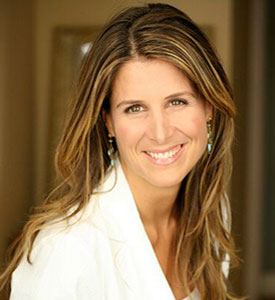 Ariane de Bonvoisin, writer, speaker and change optimist, is the founder and CEO of The First 30 Days, www.first30days.com, a website for helping people make changes in their lives. She has appeared on The Today Show and CBS and has been written about in USA Today, BusinessWeek and Oprah. Ariane grew up in 6 countries, speaks 4 languages and has an MBA from Stanford. She has had several high profile jobs but is now much happier pursuing her dreams, living spiritually and going on crazy adventures all around the world.
Ariane de Bonvoisin, writer, speaker and change optimist, is the founder and CEO of The First 30 Days, www.first30days.com, a website for helping people make changes in their lives. She has appeared on The Today Show and CBS and has been written about in USA Today, BusinessWeek and Oprah. Ariane grew up in 6 countries, speaks 4 languages and has an MBA from Stanford. She has had several high profile jobs but is now much happier pursuing her dreams, living spiritually and going on crazy adventures all around the world.
Below is an interview with Ariane on life changes and how to successfully navigate them.
Stacey: Ariane, you have experienced many changes in your life, what has been the one constant that has helped you with change?
Ariane: When you are in the midst of a change, it seems like you’ve lost control, like life, in some element, might be falling apart, your stability is rocked, but once you come through that period, you realize how beneficial the change was. Whether it was a relationship change, a career change, you moved or had a health diagnosis―whatever it was―you’re able to look back and see the positive that came from it. In my book, I call it the “change guarantee”, which states that from this change, something good will come. It doesn’t say that something good is going to happen immediately or the positive from this change will be e-mailed to you, it says something good will come.
As I’ve gone through change and as I am going through change even now, the more I can peg myself to that being the dominant constant, that something good will come, the easier change is. And I can’t see it, I don’t even believe it sometimes, I can’t even see how this is going to be a good thing, your business falls apart, you’ve lost a loved one―whatever it might be—at some point the positive will be revealed to you. Someone new might come into your life, or it might renew your faith, or you might get a completely different job, or your health might change completely. You never know what area the change is going to come.
I’ve interviewed people who have lost a loved one, people with cancer, people who have lost most of their money in the market, and I’ve never had anyone say that it was the worst thing that’s ever happened to them. They were always able to say a positive came out of this. In general, the people who are good with change, do not think life is against them or how unlucky they are. They think that life is taking care of them and conspiring for good and something beneficial will happen.
Stacey: At what point in your life, did you realize that your life purpose or mission would be to help others navigate through change?
Ariane: I realized early on that I wanted my life to be about helping people and that was clear. It wasn’t clear in what way. Because I didn’t know what the vehicle was, I took the corporate path, got the right jobs, made the money, but with the inner fuel already there of knowing that my life’s purpose and soul’s path is to contribute and serve my fellow beings, the further I got from that, the more unhappy I got. So eventually around the age of 30, I just couldn’t put up with myself anymore. I realized that I am totally off base here; it’s like being an athlete and playing tennis when you know you’re supposed to be a swimmer. Something’s wrong no matter how good you are at tennis.
The thing that helped me figure it out was that I went back to a few of my core loves and passions. One of them was reading books and the other was writing in my journal. And it was through reading and being around books and traveling a little, which got me out of my familiar work environment, that got me thinking. I knew that my purpose involved people, and I am curious and like to ask questions. I realized that everyone around me was going through change. People were getting divorced, adopting, starting businesses, had lost jobs, were going through cancer, and I became fascinated by why change is so hard. It’s the number one guarantee in life yet we hate it, we avoid it, we think we’re bad at it, we feel overwhelmed by it and so the question itself became: there must be a way to make change easier because people suffer so much when they go through change.
Stacey: Why do you think so many of us resist change?
Ariane: A couple of things, I think for parents, they feel like they need to create stability for kids and protect them from change. So they stay in the same environment, same school, go to the same church, eat the same meals. And they believe that routine and stability is what a child needs. So for years kids learn no change. Then a kid turns 14, 16 or 18 goes out in the world and suddenly so many things are changing, and they associate change as being something’s wrong, something’s off. So I tell parents that they need to teach their kids about change. They need to have them experience different things. Ask them what has changed in the neighborhood. Take them to different places even for the day. Have them realize that life is constantly changing.
The other thing is I think for most people change is really hard because we crave comfort and certainty. Even though we might be suffering in the comfort and the certainty, people would rather know their bad job or bad relationship than no job and no relationship. The unknown is so terrifying for people because they don’t really trust life. They don’t realize that a new job or a new partner will come along. There is a general lack of faith in life so we cling and grip to what we currently have even though it may not be at all what we want.
Stacey: In your book, The First 30 Days, you talk about the acceptance of change and the difference between thinking thoughts that are based in reality or illusion. Can you explain the importance of making this distinction because it seems like a lot of our suffering, as you say, can come from how we think about change?
Ariane: There is something very different between the facts of a change and the story about the change. For example, the fact is you lost your job. The story or illusion is: you’re not wanted, you’re not good enough, there are no other jobs out there, no one else is going to want to hire you once they find out your fired. You’re ashamed. You’re embarrassed. There’s a whole story around it, but the fact is you lost your job, that’s the reality.
What’s super important to know as you go through change, is that the story you tell around a change, is either going to make things easier or harder. So for many people, instead of them telling the world the facts that they got laid off because the company was going through issues, and I was one of the unfortunate ones, they say, “It’s such a difficult economy. I’m probably going to be unemployed for another 6 months. What about the bills?” so that builds a wall that prevents them from actually being able to positively navigate the change.
The story is always made up by the mind; it’s not about what’s actually going on. When your mind comes up with one of these statements like there’s no other men out there or no jobs out there, ask yourself: Is that true? Because even asking yourself that will pull you back into being real, being practical. You’ll find that you have no way to confirm that the illusion is true. Illusions are always about your fears coming out. Your fear of being unemployed, single, sick, alone, poor. But the change, in some way, is an opportunity to look at the fear that’s still running the show. You could have a fear of being alone so taking a look at that as opposed to going into another relationship quickly because you don’t want to look at the fear, is helpful to your life.
Stacey: How does the virtue of courage help in any change, either prior to making a big change or after a change occurs?
Ariane: I often pray for courage and let others know how courageous they are when they make changes. There’s a difference between people who have to face a tough change and people who initiate change. But both of them require courage. Courage to face something difficult life might have thrown your way and courage to have to break the bond of something that you don’t want in your life any more. Or, you want as new in your life. I find that you can only have courage when there’s a part of you that feels grounded, strong and taken care of. For some people it comes from themselves and for others it comes from their faith. It might come from a very loving partner where you can find your own courage because they see it in you. They remind you who you are and how strong you are.
One of the ways I help empower people through change is to remind them about changes that they have already made in the past. And that’s where they get back in touch with their courage. I say, “You’re the girl that dealt with being a single mother, You’re the woman that got through breast cancer. You’re the woman that paid for college. You’re the woman that had your Mom be depressed. You’re the woman that saw your parents get divorced.” Suddenly they get back in touch with the part of them that is really quite strong. There’s not a person in the world that doesn’t have a whole bunch of changes where they’ve had to already access their courage.
Stacey: How can the practice of gratitude help people through change?
Ariane: Knowing that no matter what is happening and that you are not alone is where gratitude comes into change. This makes a big difference for people who get through change in a good way or in a way full of suffering. And just realizing that there are people who can help. There are people you can reach out to who have been through a similar change. There are books, resources, teachers, blogs. The gratitude of knowing that help is always available as long as you’re the one that can reach out, helps with change.
Also, gratitude for what has not changed in your life. Your job might have changed but your family hasn’t changed, your kids haven’t changed, your health hasn’t changed. A lot of times when we go through a change, we assume our whole life has changed, but it’s being grateful for all the parts of your life that are stable, beautiful, great, and wonderful. See that’s the difference again between reality and illusion. I’ve helped people go through a health diagnosis and it becomes a whole life thing, but I’ve said to them, listen, you have money, you will be able to get the resources you need to look after your health. It’s about always looking for the part that hasn’t changed.
The third part of gratitude is to get in touch with the higher self, higher mind, God—whatever you want to call it―that in some way is bringing this change to you because there are lessons for you. You might realize that if you continued in the same job, or relationship or city that your life would have probably stagnated. So it’s thanking life for teaching you lessons, helping you grow and for someone who is going to come into your life now. If you start thanking life, I promise you that life starts taking care of you better. You get what you focus on. Whatever is in your mind, is what’s reflected back to you.
Stacey: I always find that the practice of gratitude, in its simplest form, turns a negative into a positive.
Ariane: Sure, and asking yourself: How can this change be a good thing? What can I learn from this? Who can help me? If this were something positive, how would it be positive? When you ask those questions, the mind answers them. The mind will answer any questions. You might as well ask good ones.
Stacey: How does spirituality, or accessing our higher selves, help when going through a change?
Ariane: This is one of the nine principles of change that are outlined in my book. I believe that all change is an invitation to go within. It’s not an invitation to fix your external life. It’s an invitation to go within and find the part of you that does not change. Finding the part of you that is calm. The part of you that’s detached from the drama, from the emotion or story of what is now changing. Most people are very disconnected from that because they’re much more interested in moving the pieces around in their life. What about the relationship, check, now I’ve got to work on the body, check, now I’ve got the job and the home, check. So there is nothing internal that is actually the glue. So when one of those things changes, guess what, you feel unglued. When you put your glue and safety on things that are guaranteed to change, you are inviting suffering. When you put your glue and safety in something internal, that does not change, that’s when you feel pretty solid no matter what.
I am a big believer of inviting people, very slowly, to sit with themselves. Find 10 or 15 minutes a day just to be quiet. You don’t even need to call it meditation. But do nothing. Start listening to what’s going on. Feel into your body. Where is there tension? Why is there tension? What’s going on in your throat? What would you like to express? When you sit with yourself, you’ll start to hear what’s going on with you, and tune back into your body. If sitting isn’t your thing, take a walk, listen to some lovely music, write in a journal, go walk in a forest, hang out with pets, but find some way to go back into a place where you’re not busy, you’re not doing, you’re not on Facebook or any technology. You go back to having your own inner technology. Your inner connection to something. I think people are craving that now. They feel so disconnected, and they don’t know what they’re disconnected from. Silence is very scary for people because suddenly they start hearing what’s going on for them. And most people don’t want to hear that they’re in the wrong relationship, or that they hate their job. They don’t want to hear they’re still smoking, so they avoid silence. They avoid the more spiritual connection, which is always trying to get us on our path, to do what we love, to be happy and mindful.
I think that the word spirituality can scare people, but I remind people that some of the most spiritual people I know are not at retreats, they’re not in workshops, they’re not reading the books. It’s a way of being, a way of living, a way of treating people and themselves. Spirituality is about the choices you make for yourself. You can tell if someone is spiritual without even asking them a question. Just look at their life.
Stacey: We are so bombarded with messages from e-mail, voicemail, TV, that’s such a great practice to take 10-15 minutes of your day to connect with your mind and body.
Ariane: People say to me, “But I’m so busy.” I say to them that you manage to find the time to eat three times a day. You always find time to check your e-mail 20 times a day! If people say to me, I don’t have 10 or 15 minutes, I say to them then something is wrong with your day if you don’t have this time to do the most important work for yourself, which is to be still. The people who do this as a practice are much more intuitive, better at work, they’re kinder, less reactive, and make better decisions. The benefits are huge; it’s not a waste of time.
Stacey: Are there any other ways that can help people embrace change better other than what we’ve talked about?
Ariane: A couple of things come to mind. One is that people who embrace change have standards for their life. They are not at the mercy of whatever is going to happen is what’s going to happen. So there is a sense of being a creator of life, of being in the driver’s seat, and you can adapt to a change life throws you. So there’s not the sense of powerlessness of believing life is going to be what it’s going to be. I see a big distinction with people who feel like they can make a change happen versus people who sit back and assume life’s going to be what it’s going to be.
The other thing that I like touching upon is all the excuses that people go through as to why they can’t change. I’ve obviously heard most of them by now, but it’s interesting to see how some people hold onto their excuses as reasons they can’t change. You have excuses like, “I’m too old” or “I’m too young”. Well guess what, some people are exactly your age and did exactly the change you’re thinking about. So that excuse cannot be the truth. Or, it’s going to take time. People who are going to change, they know that change is not going to happen in two weeks. It’s the reason most people don’t achieve their new year’s resolutions because they give themselves so little time to make the change. Give yourself 6 months or a year, and I guarantee that you will achieve your new year’s resolutions. But not if you give yourself until the end of January. Then you feel like a failure. So people who are good at change have a much more gentle and kind relationship with time. They give themselves time, to heal, to change, to find their dream, to get into the right relationship.
Finally, people who are good at change are very human. They don’t have the action plan, they haven’t read the ten books. They’re gentle on themselves. They let themselves make mistakes. They pick themselves back up again. They’re not beating themselves up because they don’t have a job. There is none of that disapproval or inner critical energy. When you are loving, kind and gentle with yourself, life becomes loving, kind and gentle with you. And you’ll show up differently at your next interview. Or on the next date, whatever it is. Gentleness, to me, is something that’s severely needed in the world right now. But it cannot happen externally if you’re not being gentle with yourself. And there is so much self-disapproval. Watching the inner dialogue is very important when going through a change.
Stacey: Seems like being more gentle in our inner dialogue is key to successful transitions.
Ariane: I watch my inner dialogue all the time. I can detach from it and see that the voice is not my higher voice. Most people, they think, well, that’s my inner voice, that’s the truth and that’s the only voice I have. It’s teaching people to be able to see where that voice is coming from. Is it my parent’s voice, society’s voice, a fear voice? When the self-disapproval isn’t there, it’s amazing what people feel they are able to do.
Stacey: When you speak to individuals and/or groups, what is one of the most pressing questions that they want to know about change?
Ariane: Many people associate change with money. They say they can’t leave their job because of money. They can’t get divorced because there’s not a lot of money. They can’t move or travel because of money. The association between change and money is very strong for people. So I spend a fair amount of time disassociating those two concepts. When money is people’s biggest fear and change is people’s biggest fear, when you put those two things together, no one is ever going to change. You have to disentangle them because the money excuse makes them feel safe and secure that now they don’t have to change. They’ve got the money excuse. This is where I start to get creative and ask them what’s really going on. Because it’s very often not about money, there’s something else actually holding them hostage.
Another one is that many people are already in the mindset of wanting to make a change, and they just need a push. But what I find is that they are around people who are pretty negative and not encouraging. Your family will not encourage you to change. Your partner will not encourage you to change. Your best friend sometimes would prefer you be a smoker and eat crap. Sometimes the people closest to you are quite negative in influencing you. They like you the way you are. People just want to know that life is going to take care of them. That is what they are looking to hear. It’s not about how do I get a divorce, or start a business. It’s not about the actions, it’s more about the feeling they are looking for that everything will be okay.
Stacey: Why do you think family and friends don’t want you to change? Is it because they feel threatened?
Ariane: When you start changing, it threatens their connection to you. So their number one thing is, what does it mean for me. What does this mean for our family that she is going to pursue her dream? What does it mean that she is going to the gym, and I’m fat. What does it mean for me that she wants to learn a language? The question is always what does it mean for me. It’s not that they want to prevent it for you. They’re just scared of losing you, losing love, losing their connection to you.
The other thing is, when you start changing, you are a giant mirror for people who are not changing. I have people who don’t really want to spend much time with me because the minute I walk in a room they are reminded about the fact that they hate their job, and they could change it for the better. You’re a walking mirror for other people looking at their changes, and people don’t want to look in the mirror because they don’t like what they see. A lot of it is knowing that you’re not here to have people be comfortable around you. You’re here to also encourage them to change. You don’t have to be mean about it. You can say I believe you can lose the weight too. I believe you can find what you most want to do with your life. That’s really different from you should leave your job too. Your change support team is very often not your family and friends. And it’s where people go wrong because they go to their family and friends for support and encouragement first and get very little. This makes them even more terrified of making the change.
Stacey: Really the best way we can help people, our family and friends, is to ask the right questions that are going to make them wonder about their lives instead of avoiding the questions because we are afraid of their reaction.
Ariane: Yes, and also giving them permission to change. My parents weren’t supportive of my changes. And I had to work through the little girl in me that wanted my parents’ permission. We all want our parents’ permission―who we marry, what we do, the work we do―on some level we are made to get our parents’ and teachers’ approval. We want the approval of our best friend, our spouse and when we go through change, you should not expect permission and approval. Just do it. I promise you, the approval will come later. But it’s not for right now.
Stacey: What is the most important thing you want people to take away from this interview?
Ariane: I would say to help people get in touch with a change that they would love to make. Because when they start pursuing that, there is a force of energy, creativity, and passion that’s unleashed. People are not asking themselves that question anymore: what is a change that I would love to make? It could be to write a book, go to Rome, learn to play guitar, plant a garden, but they need to start watering that seed of the change they’d love to make. It’s not a conversation that you are having with your friends or yourself. And I’m not talking about a goal, or resolution, those words have a different energy. I’m talking about a change you would love to make such as redecorating your bedroom; it could be that small.
Don’t take on a massive change just start getting in touch with a change you’d love to make. That’s when you start using your change muscle. That’s when you see life supporting you. One for me is that I’d love to learn astrology and how to interpret charts. It’s a tiny change but now I’m looking on the internet, at online courses, and I’ve met someone who might teach it to me. You start to move in small directions and there’s an excitement, a buzz about something you’d love to do.
Here’s the message: Associate the fact that all the great things that have ever happened in your life, from you meeting someone, having a child, getting work, all that has happened is because something changed. When we think of change, we think of all the bad changes, not all the good changes. It’s rewiring yourself to get back in touch with what your dream is, a change you’d love to do. If it doesn’t come immediately, just hold the question and be open and patient; you’ll find it. You may see it on TV or come across someone who is doing something that inspires you to do the same.
Stacey: That’s great, just holding the question and letting it come to you.
Ariane: Yes, because people don’t spend any time thinking about that. They’re always just trying to juggle, manage and contain stress so they’ve lost their connection to the heart’s inspiration. When you start asking that question of what you love to do, the mind will wake up again because that’s when you start to connect to your joy, your energy, your self-love and doing something you want. That gives you self-esteem. Then you can take care of your body, your work, your finances. You see, it builds.
Stacey: Thank you Ariane.
 Ariane de Bonvoisin’s newest book:
Ariane de Bonvoisin’s newest book:
What I Wish Someone Had Told Me About Writing a Book is a goldmine of tips, secrets, mistakes to avoid and things to do when you want to write, publish and sell your book. Included are experiences of over a dozen successful authors. You will not regret reading this! Available as a printed book and ebook.
 First 30 Days: Your Guide to Making Change Easier
First 30 Days: Your Guide to Making Change Easier
Are you in the middle of a life change or want to make a change? Whether a health, financial, career, relationship or family change, this book is for you. Discover the 9 Principles people who successfully navigate change know, the emotions that make change hard and what actions to take. Available as printed book, ebook and audio.
To find out more about Ariane or purchase her books, visit www.arianedebonvoisin.com.
To follow her on Facebook : Ariane de Bonvoisin (public figure page)
On Twitter: @clickariane






Great post Stacey. Thanks for the indepth Q&A on the topic of changes. We all face changes everyday, some large and some small. We need to remember all the good that comes from these changes. Thanks for highlighting this topic. Also, great website, very uplifting!